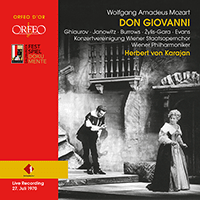Geraint Evans
Geraint Evans was born into a musical family where his father, a choirmaster, actively encouraged his musical gifts as a singer and gave him violin lessons. Singing in a performance of Mendelssohn’s Elijah at the age of only seventeen he was noticed by Idloes Owen, in whose choir Evans sang, and was persuaded by him to study singing seriously. Having joined the RAF after the outbreak of World War II, Evans trained as a radio mechanic and participated in services entertainment. After the war, while stationed in Hamburg, he sang there and took lessons from Theo Hermann. Evans later studied at the Guildhall School of Music in London with Walter Hyde and with Fernando Carpi in Geneva; but it was through Hermann that he successfully auditioned for Karl Rankl, the music director of the new Covent Garden Opera. He made his debut there in 1948 as the Night Watchman / Die Meistersinger von Nürnberg.
Covent Garden was to be Evans’s artistic home. He first sang Figaro / Le nozze di Figaro (a part that was to become one of his international signature roles) there in 1949 and in addition to numerous repertoire parts also sang in several world premieres, creating Mr Flint / Billy Budd (1951), Lord Mountjoy / Gloriana (1953) and Antenor / Troilus and Cressida (1954). At the Glyndebourne Festival Opera, where Evans, with his engaging personality, quickly became as much a house favourite as at Covent Garden, his debut came in 1950 as Guglielmo / Così fan tutte. Other roles at Glyndebourne included Leporello / Don Giovanni and Papageno / Die Zauberflöte and, most importantly, the title part in Falstaff (1957). At Covent Garden Evans later sang Beckmesser / Die Meistersinger von Nürnberg, Ned Keene / Peter Grimes, Enrico / Lucia di Lammermoor, Posa / Don Carlo, the four villains / Les Contes d’Hoffman, Fra Melitone / La forza del destino, Don Alfonso / Così fan tutte and Dr Bartolo / Il barbiere di Siviglia; but a venture into the higher baritone repertoire with the title part in Rigoletto, in 1964, was not successful.
Evans made his American debut in 1959 as Beckmesser with the San Francisco Opera. With this company he sang for twenty-four years, giving his first Wozzeck (1959) there before singing this role successfully in London and at the Salzburg Festival. Other key roles on the west coast included Kecal / The Bartered Bride, Bottom / A Midsummer Night’s Deam and the title role in Gianni Schicchi. His debut at the Chicago Lyric Opera came in 1961 with Giannini’s The Harvest. Once again Evans established close ties with this company, singing his first Claggart / Billy Budd there. At the Metropolitan Opera, New York his first appearance was in 1964 as Falstaff. Here he appeared regularly until 1972, notable characterisations being Don Pizarro / Fidelio (1966) and Balstrode / Peter Grimes (1967).
Back in Europe, in 1960 Evans became the first British singer to appear at La Scala, Milan since the end of World War II when he made his debut there as Figaro. In the same role he first appeared at the Vienna State Opera in 1961, returning as Papageno, Beckmesser and Leporello. The Salzburg Festival saw another Evans debut, when in 1962 he sang Figaro; he returned regularly as both Figaro and, from 1969, Leporello.
Later roles included the title part in Don Pasquale and Dulcamara / L’elisir d’ amore, as well as Trader Case in Alun Hoddinnott’s The Beach of Falesá with the Welsh National Opera (1974) and Baron Prus / The Makropoulos Case at San Francisco (1976).
Knighted in 1971, Evans gave his farewell performance at Covent Garden as Dulcamara in 1984, after which he remained active as a stage director. His final public appearance was at the farewell gala for the old Glyndebourne Opera House in 1992.
On stage Evans was a consummate operatic actor, one of the finest of his generation in comedy, investing all his portrayals with extraordinary humanity, a characteristic which he himself possessed in abundance.
© Naxos Rights International Ltd. — David Patmore (A–Z of Singers, Naxos 8.558097-100).

















